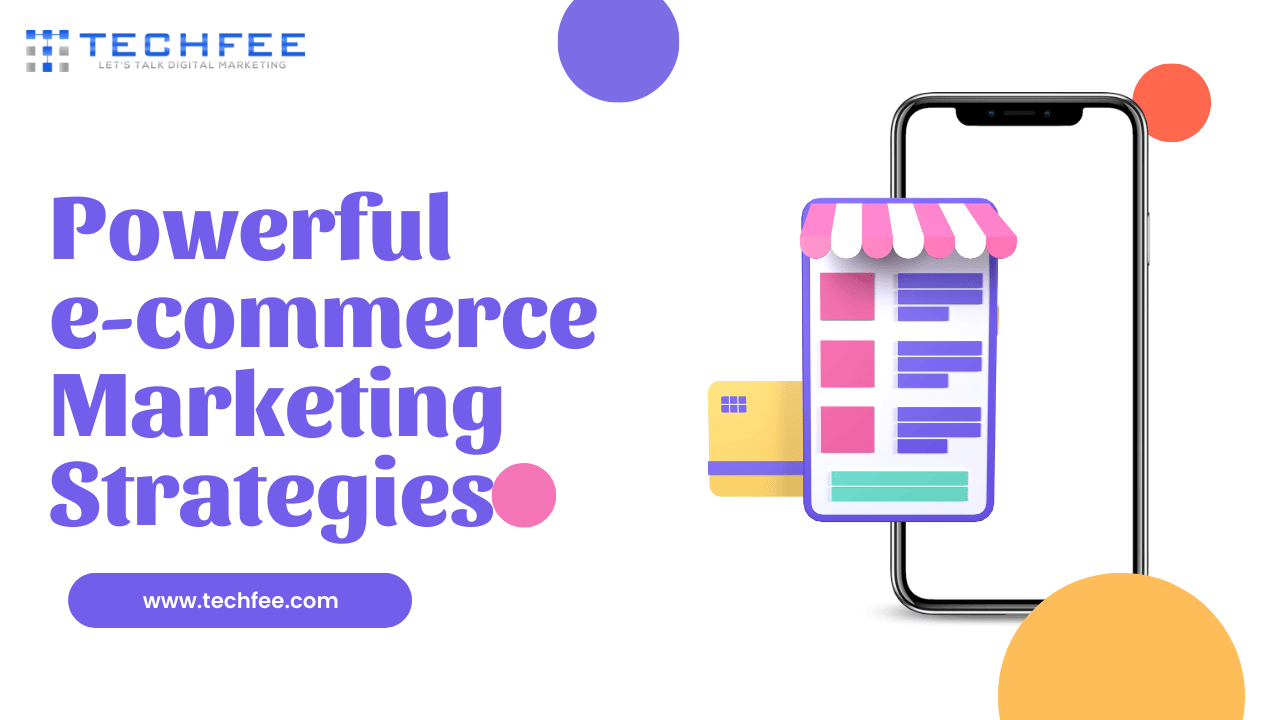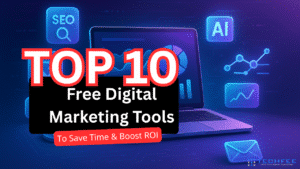Did you know the global e-commerce market will exceed 6.38 trillion USD by this year ? As a result, businesses worldwide are investing in e-commerce marketing strategies and techniques to take advantage of this enormous growth potential.
In this article, we will discuss the most effective e-commerce marketing strategies businesses can use to improve their online presence and boost revenue.
We’ll cover everything from optimizing product pages to utilizing social media and email marketing so businesses have everything they need to succeed in the competitive world of e-commerce.
However, there are other tactics that companies can use to maximize their e-commerce marketing efforts. So, let’s explore the world of e-commerce marketing strategies and discover how your company can thrive online.
What Is E-commerce Marketing?
E-commerce marketing refers to the process of promoting and selling products or services through online platforms. This involves using different tactics to draw the attention of potential customers toward an e-commerce website, engage them with exciting content, and eventually convince them to make a purchase.
Some popular e-commerce marketing strategies include search engine optimization (SEO), social media marketing, email marketing, pay-per-click (PPC) advertising, and content marketing.
A successful e-commerce marketing campaign requires a thorough understanding of the target audience and the latest digital marketing methods and trends in the industry.
Why Is E-commerce Marketing Important?
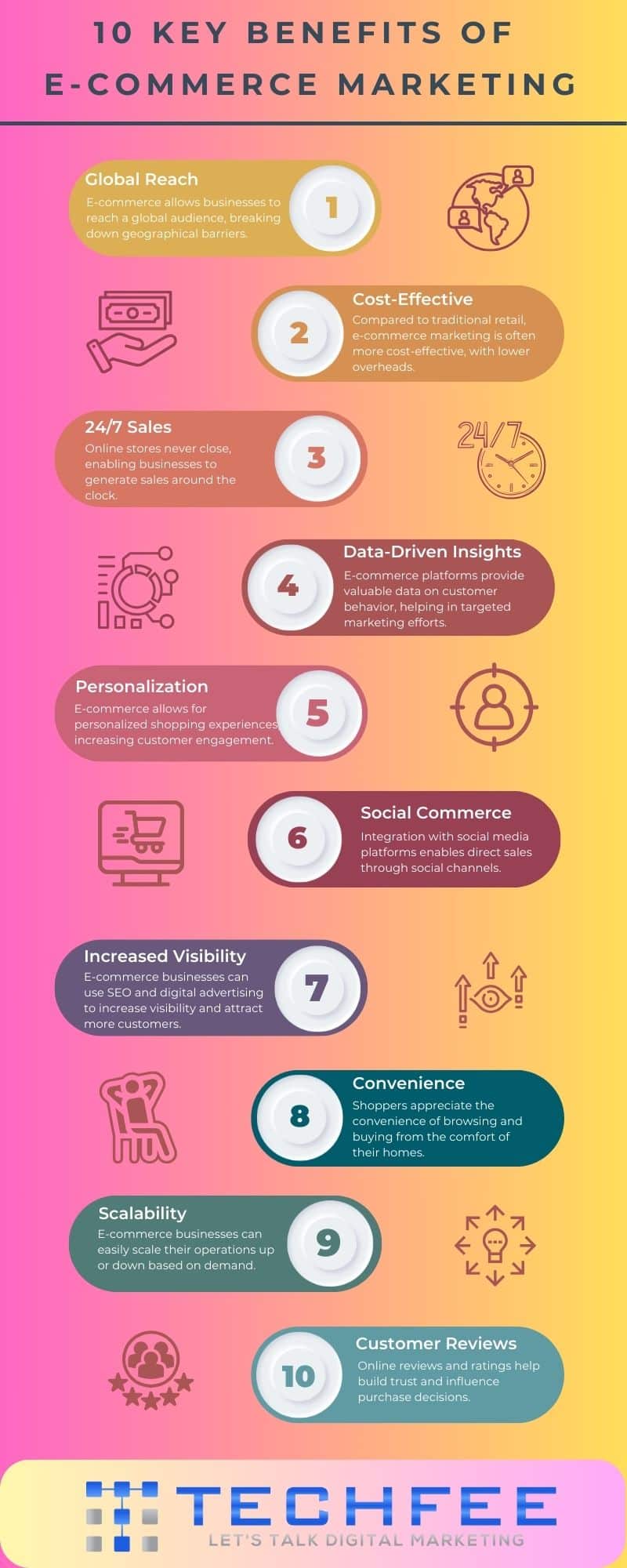
In today’s world of technology and the internet, online marketing has become an integral part of the success of any business, especially those in e-commerce.
With harsh competition in the online marketplace, businesses must stand out to attract and retain customers. This is where effective e-commerce marketing strategies come into play, as they can help businesses increase brand recognition, drive website traffic, and ultimately boost sales.
There are various marketing techniques that e-commerce businesses can use to reach out to their target audience, including search engine optimization, social media marketing, email marketing, and pay-per-click advertising.
However, businesses must implement e-commerce marketing strategies to stay caught up on potential sales.
How To Build a Marketing Plan for E-Commerce
To create a successful e-commerce marketing strategy for your e-commerce business, it’s essential to understand the people you’re trying to reach and what they want.
First, define your business goals and determine which marketing channels will be most effective in helping you reach them. These include social media, email marketing, search engine optimization (SEO), pay-per-click (PPC) advertising, and content marketing.
Once you’ve decided on your channels, create a content plan that aligns with your goals and speaks directly to your target audience. This could include blog posts, videos, infographics, and other engaging materials that educate and inform your audience.
Setting measurable goals for your marketing efforts and tracking your progress over time is also important to ensure you’re moving in the right direction.
By following these steps, you can develop a marketing plan that helps your e-commerce business grow while building lasting relationships with your customers.
Types of E-Commerce Business Models
When businesses engage in online transactions to generate revenue, they adopt e-commerce business models. These models vary depending on the type of transaction and target audience.
B2B e-commerce involves transactions between two businesses, while B2C e-commerce is commerce between businesses and individual consumers.
On the other hand, C2B e-commerce allows individual consumers to sell products or services to businesses, and C2C e-commerce enables individual consumers to sell products or services to other consumers.
Therefore, it’s essential to weigh the unique advantages and challenges of each model and carefully consider the target audience and product or service offerings before deciding which e-commerce model to pursue.
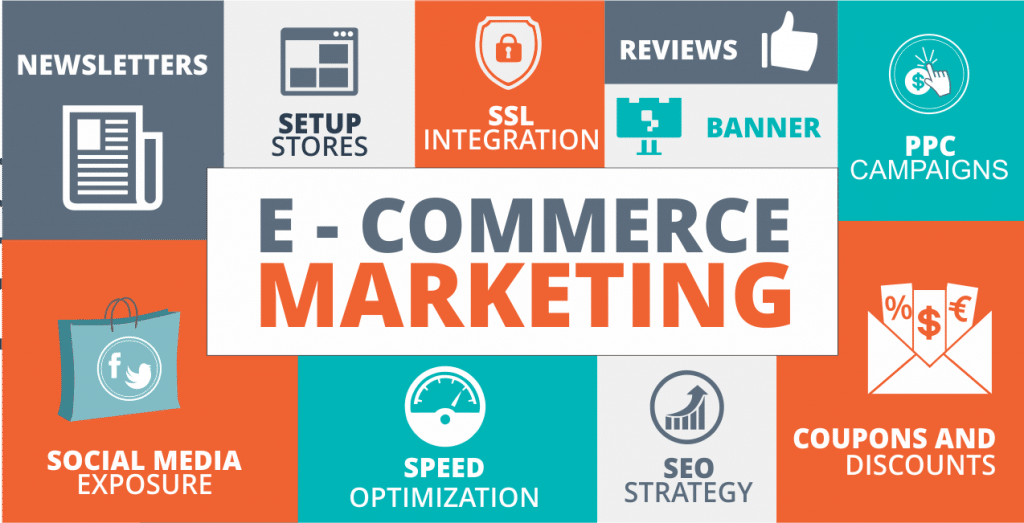
Top E-Commerce Platforms
• Shopify
Shopify has quickly become one of the most popular e-commerce platforms for businesses seeking an online presence. Entrepreneurs can quickly build and manage online stores with various tools and services.
What sets Shopify apart is its customizable templates, user-friendly interface, and integrations, making it an excellent option for businesses of all sizes looking to connect with customers worldwide.
Additionally, Shopify provides features that allow businesses to handle their inventory, process orders, and keep track of their sales. This versatility makes Shopify the ideal solution for anyone looking to launch or expand their online retail presence, from small startups to large corporations.
• Woocommerce
WooCommerce is a widely used e-commerce platform businesses of all sizes frequently rely on. It functions as a WordPress plugin that enables users to swiftly establish an online store and showcase their products and services for sale.
With its exceptional capabilities and flexibility, WooCommerce has become the preferred choice for numerous companies seeking to establish a digital presence.
Its noteworthy features include customizable designs and themes, a wide range of payment options, and built-in tax and shipping calculators.
Moreover, WooCommerce offers various extensions and add-ons that can be utilized to enhance its functionality and customize it according to a business’s specific needs.
Overall, WooCommerce is a trustworthy and effective e-commerce platform that can support businesses of all kinds in succeeding in the competitive world of online commerce.
• Bigcommerce
Bigcommerce is a leading e-commerce platform providing businesses with the necessary tools to create and manage online stores. With a user-friendly interface and robust features, anyone can easily set up an online store and start selling their products.
Bigcommerce offers customization options, powerful analytics and reporting tools, and seamless integration with popular payment gateways and shipping providers.
Whether a new small business owner or an experienced e-commerce professional, Bigcommerce has all the necessary components to help you succeed in the highly competitive online retail market. This is why Bigcommerce is considered the best e-commerce platform for small businesses.
• Magento
Over the past few years, Magento also has emerged as a popular choice among businesses looking for an e-commerce platform. Specifically created for online businesses, Magento is a flexible and sturdy platform that makes it easy for businesses to develop and manage their online stores.
Its range of features and functionalities provides several customization options, enabling businesses to tailor their stores to their specific requirements.
One of the main advantages of Magento is its open-source nature, which gives businesses access to the platform’s source code, allowing them to make necessary modifications and customizations.
Additionally, Magento offers seamless integrations with several other commonly used platforms, such as payment gateways, shipping providers, and marketing tools, making it a versatile and potent solution for e-commerce businesses of all sizes.
• Wix
Wix is a widely recognized website builder that doubles as an eCommerce platform catering to small businesses. Its interface is straightforward to use, allowing entrepreneurs to set up online stores with ease and speed.
Wix has an array of customizable templates and payment gateway integration, making eCommerce simple. It also offers a variety of marketing tools that help businesses reach their target audience effectively.
Whether you are a seasoned eCommerce vendor or a beginner, Wix has everything you need to launch and run your online business quickly and efficiently.
• Squarespace
Squarespace has become a widely recognized platform for website creation in recent years, mainly due to its eCommerce capabilities. It provides businesses with various tools and features to easily create and manage their online stores.
One of the significant advantages of using Squarespace as an eCommerce platform is the ability to customize the look of your storefront. Whether you’re selling physical goods or digital products, Squarespace makes it easy to create a visually attractive and professional storefront that will draw in and engage customers.
Furthermore, Squarespace includes a range of powerful eCommerce functionalities such as inventory management, order tracking, and payment processing. These are incredibly helpful for small businesses and entrepreneurs who want to sell their products online.
Squarespace is an excellent choice for anyone looking to establish a professional online store without extensive technical knowledge or experience.
Powerful E-Commerce Marketing Strategies to Boost Sales
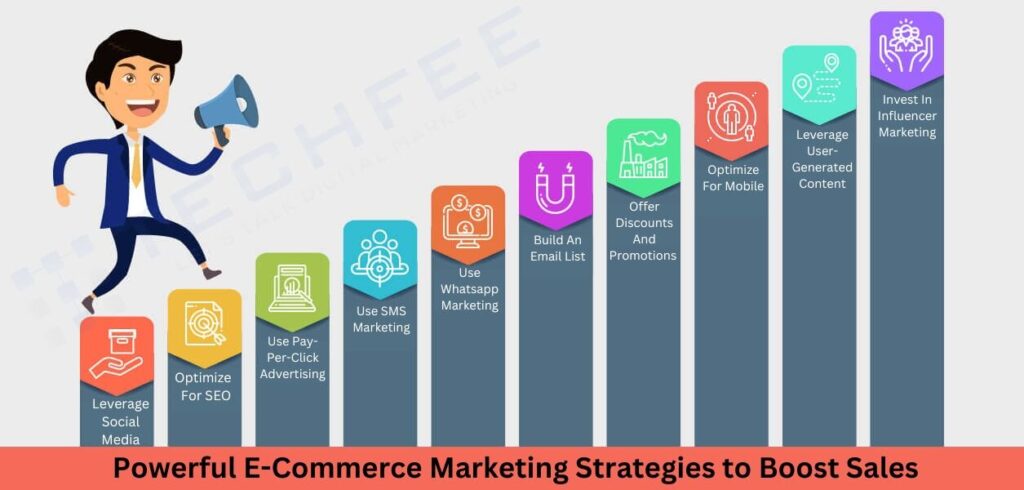
1. Leverage Social Media
Using social media is a compelling strategy for businesses engaged in e-commerce. It enables them to advertise their products or services and connect with prospective customers.
Social media platforms such as Facebook, Instagram, Twitter, and LinkedIn are widely used, allowing businesses to reach a larger audience.
They can also create fascinating content, targeted advertising, and increased traffic to their website.
Moreover, social media provides a valuable channel for customer engagement and feedback, which can enhance customer experience and promote brand loyalty.
Therefore, e-commerce businesses must leverage social media to succeed in today’s digital marketplace.
2. Optimize Your Website For Search Engines Optimization
To increase your online sales, it is essential to make sure that your e-commerce website is optimized for search engines. This will help potential customers find your site more efficiently and improve your visibility in search results.
You can use various techniques to optimize your website for search engines, such as researching and optimizing keywords, creating high-quality content, improving your website’s structure and navigation, and building high-quality backlinks.
By taking these steps, you can optimize your website’s search engine, resulting in more traffic and customers for your online store.
Read here: A Comprehensive Guide on How to Do SEO
3. Use Pay-Per-Click Advertising
Pay-Per-Click (PPC) advertising is a valuable e-commerce digital marketing strategy many businesses use nowadays. By utilizing PPC, online companies can target their specific audience and only pay for the clicks they receive, which helps them to manage their advertising budget effectively and get the best return on investment.
Besides, PPC campaigns are customizable and can be optimized to improve their effectiveness, resulting in better conversion rates and increased revenue.
Thus, implementing a well-planned and executed PPC campaign can be a smart move for businesses looking to boost their e-commerce sales.
4. Use SMS Marketing
In today’s world, SMS marketing has become an integral part of e-commerce marketing strategies. The use of mobile devices has skyrocketed, and text messaging has emerged as a powerful tool for businesses to connect with their customers instantly.
Using SMS, e-commerce businesses can send promotional messages, discounts, and updates about new products or services, enhancing customer engagement, increasing sales, and generating higher ROI.
It’s crucial for businesses to follow relevant regulations and respect their customers’ privacy when implementing SMS marketing campaigns.
However, when appropriately executed, SMS marketing can be an effective and efficient way for e-commerce businesses to engage with their audience and generate revenue.
5. Use Whatsapp Marketing
WhatsApp can be a valuable tool for an e-commerce business looking to connect with customers and expand its reach. By incorporating WhatsApp marketing into your overall e-commerce marketing strategies, you can build a stronger relationship with your customers and effectively promote your products and services.
With WhatsApp, businesses can easily send personalized messages, exclusive deals, and updates straight to customers’ mobile phones, helping to keep your business top-of-mind and increase sales.
Additionally, the group chat feature on WhatsApp allows you to create a community of loyal customers who can offer valuable feedback, suggest new products, and interact with your brand in real time.
With WhatsApp marketing, e-commerce businesses can significantly enhance brand recognition, customer engagement, and sales performance.
6. Build An Email List
Building an email list can be an effective marketing strategy for e-commerce businesses. This method involves gathering the email addresses of your website visitors and customers to establish direct communication and promote your products or services.
By creating a personalized communication channel, you can keep your brand at the forefront of customers’ minds and increase customer loyalty. You can also use this approach to send newsletters, promotions, and other marketing messages that can drive traffic to your website and boost sales.
One of the benefits of email marketing is the ability to customize your messages based on subscribers’ interests and actions. This feature can help you tailor your marketing efforts and provide your audience with relevant and engaging content.
Building an email list is crucial for any e-commerce business seeking growth and success in today’s competitive digital landscape. So if you haven’t already, consider adding email marketing to your arsenal of marketing strategies.
7. Offer Discounts And Promotions Through Email Marketing
Email marketing is a powerful tool to help eCommerce businesses promote their products and services and increase sales. One effective strategy for creating a successful eCommerce marketing plan is to offer discounts and promotions through email marketing.
This can encourage email subscribers to make purchases and create a sense of urgency around your products.
Additionally, email marketing allows businesses to track engagement and adjust their approach based on the data they collect. To make the most of your email campaigns, it’s essential to segment your audience and personalize your messages based on their interests and behavior.
By utilizing the potential of email marketing, eCommerce companies can build brand recognition, foster customer loyalty, and drive revenue growth.
8. Create Compelling Product Descriptions
Composing compelling product descriptions is crucial to any successful e-commerce marketing strategy. A well-crafted product description can significantly influence a potential customer’s purchase decision.
It’s important to emphasize the product’s benefits and how it can solve a customer’s specific problem to achieve this. The language used in the description should be clear and simple, with relevant details such as measurements, materials, and unique features included.
In addition, showcasing positive customer feedback and reviews can enhance the product’s credibility. By putting in the time and effort to create engaging product descriptions, you increase your chances of converting potential customers into loyal ones.
9. Optimize Your Product Pages
Optimizing your online sales and your e-commerce website’s product pages is essential to increase your online sales. A well-crafted product page can help customers make informed purchase decisions by providing comprehensive information.
You can start by including high-quality product images from different angles and writing accurate descriptions for each item.
Additionally, customer reviews and ratings can add to the credibility of your products, making them more reliable in the eyes of potential buyers.
Lastly, ensuring that your website has a user-friendly interface and a straightforward layout is crucial, making it easy for customers to find what they want.
Optimizing your product pages can enhance your customer’s shopping experience and increase your chances of selling.
10. Optimize For Mobile
In today’s digital era, having a mobile-friendly e-commerce website is vital to ensure the success of your online business. With more and more shoppers using their smartphones and tablets to make purchases, optimizing your website for mobile devices is crucial.
The first step towards achieving this goal is to ensure that your website is responsive, which means it adapts to different screen sizes and resolutions. This will make it easier for your customers to navigate your site and purchase products from any device they prefer.
In addition, it’s important to consider the loading speed of your website since mobile users tend to need more patience for slow-loading sites. Therefore, optimizing your site’s loading speed can make a big difference in customer satisfaction and ultimately increase sales.
Finally, streamlining and simplifying the checkout process on mobile devices is also critical. By focusing on mobile optimization, you can create a better customer shopping experience and drive more sales for your business.
11. Start A Content Marketing Program
Starting a content marketing campaign can be a highly effective way to engage with your audience and generate leads for your company.
First and foremost, defining your goals and identifying your target audience are essential. You also need to determine which types of content will resonate best with them. This may include blog posts, social media content, videos, podcasts, or other formats.
Once you’ve figured that out, you’ll need to create a content calendar and establish a process for creating and distributing your content.
It’s crucial to track your progress and evaluate the success of your program using metrics such as social media engagement, website traffic, and lead generation.
With a well-planned content marketing strategy, you can position your brand as a thought leader, build trust with your audience, and drive revenue growth.
12. Leverage User-Generated Content
A powerful technique for promoting your e-commerce business is through user-generated content. Your customers or users create this type of content, such as social media posts, feedback, and product reviews.
Including user-generated content in your marketing campaigns can build credibility with your audience and showcase how your products or services are used in real-life situations.
This approach is precious for e-commerce businesses as it allows potential customers to see your products in action.
Incorporating user-generated content into your e-commerce marketing plan can help boost brand recognition and increase sales.
13. Invest In Influencer Marketing
Influencer marketing can be a highly effective approach to promoting your e-commerce business. By partnering with influencers, you can reach out to a vast and engaged audience, many of whom could become potential customers for your brand.
Working with the right influencers allows you to tap into their credibility and authenticity, leveraging their endorsement to promote your products or services in a way that resonates with their followers.
This can lead to increased brand recognition, more website visitors, and, ultimately, more sales. It is essential to recognize the benefits of influencer marketing and its Impact on the success of your overall e-commerce marketing strategies.
14. Use Retargeting Ads
Over the past few years, retargeting ads have become a popular and highly effective marketing strategy for e-commerce businesses. With the fierce competition in the online retail industry, it’s crucial to remain top of mind with potential customers who have shown interest in your brand or products.
Retargeting ads help achieve this goal by displaying advertisements to individuals who have previously engaged with your brand or visited your website. This approach can significantly increase conversion rates, boost sales, and establish brand recognition and loyalty.
By incorporating retargeting ads into your overall e-commerce marketing plan, you can target a specific audience and maximize the Impact of your advertising efforts.
15. Sell On Marketplaces
Recently, many businesses have started to sell their products on online marketplaces as it has become a popular eCommerce marketing strategy.
This strategy aims to tap into the existing audience on platforms like Amazon, eBay, and Walmart to reach a broader customer base and boost sales.
However, to be successful in selling on these marketplaces, businesses need to take a thoughtful and strategic approach that factors in essential aspects like pricing, product selection, and customer feedback.
Besides, businesses must optimize their product listings to improve visibility on search engines and stay competitive by continuously monitoring and adjusting their approach.
If implemented correctly, selling on marketplaces can be an effective and profitable marketing strategy for businesses of all sizes.
16. Implement Live Chat
Integrating live chat into an e-commerce website can revolutionize the way e-commerce marketing strategies are employed. Live chat enables online businesses to instantly engage with their customers, creating a customized experience while resolving any inquiries or doubts that customers may have.
This level of support enhances customer satisfaction, boosts sales, and strengthens brand loyalty. Furthermore, live chat facilitates valuable analysis of customer behavior and preferences, empowering businesses to optimize their marketing strategies and tailor their approach to better serve their intended audience.
In conclusion, integrating live chat is wise for e-commerce businesses striving to remain competitive in today’s rapidly evolving digital world.
17. Focus On Customer Reviews
In today’s highly competitive e-commerce industry, businesses need effective marketing tactics to stay ahead of their rivals. One of the most successful strategies is to focus on customer reviews.
By valuing and utilizing customer feedback, e-commerce companies can build trust with their target audience, improve brand loyalty, and increase sales.
This approach helps businesses understand their customers’ needs and preferences and provides valuable insights into their overall shopping experience.
By leveraging this information to optimize their marketing strategies, businesses can attract new customers while retaining existing ones, leading to sustained growth and success in the e-commerce industry.
18. Encourage Customer Loyalty With Rewards
A highly effective way to boost your e-commerce business is by focusing on customer loyalty through a rewards program. By providing incentives to customers, such as discounts, free products, or exclusive access, you can encourage them to continue buying from your brand.
This results in a dedicated customer base that provides repeat business and positive shares experiences with others. Please consider your customer’s behavior and preferences to tailor rewards that meet their needs and desires.
By implementing a well-designed rewards program, you can build a lasting relationship with your customers, leading to long-term success for you and your business.
19. Personalize Customer Communication
One of the keys to successful e-commerce marketing is personalizing your communication with customers. This means tailoring your messages and interactions to match their preferences and behaviors.
When you do this, you can build stronger relationships with customers and ultimately increase sales. Here are some tips for effective personalization in e-commerce:
- Collect and use customer data:It’s essential to gather data on your customers’ browsing and purchasing habits, demographic information, and preferences. Doing this allows you to tailor your messages and recommendations to each customer.
- Use targeted messaging:Consider sending targeted emails and notifications based on each customer’s behavior. For example, you can send abandoned cart reminders, personalized product recommendations, and special offers on products they’ve shown interest in.
- Implement dynamic content: Dynamic content on your website and emails can display products and messages relevant to each customer’s interests and behavior.
- Personalize customer service:You can use chatbots or customer service representatives to engage with customers in a personalized way. This can be based on their previous interactions and preferences.
- Use social media: Social media is another tool you can use to engage with customers and personalize your messaging based on their interests and behavior on social media platforms.
Personalizing customer communication can improve the overall customer experience and drive more sales. Remember to use data and targeted messaging to create a more personalized experience that resonates with your customers and encourages them to continue shopping with you.
20. Host Product Giveaways
Offering product giveaways can be a powerful tactic for e-commerce businesses to promote their brand and attract new customers. By giving away complimentary items or services, businesses can generate excitement and buzz around their products, leading to increased online visibility and engagement.
Hosting these giveaways on popular social media platforms like Facebook and Instagram can help businesses reach new audiences and expand their online following.
However, to maximize the benefits of this marketing strategy, businesses must have a clear objective and plan in place, such as driving sales or building brand awareness.
By employing the right approach, product giveaways can be an effective way for businesses to enhance their online presence and grow their sales.
21. Give Bonuses For Referrals
One effective marketing strategy for e-commerce businesses is to offer rewards for customer referrals. You can attract new business and increase revenue by encouraging your existing customers to refer their friends and family to your online store.
By offering an incentive, such as a free product or a discount, you can motivate your current customers to spread the word about your brand.
Not only does this help build loyalty and increase the chances that the referred individuals will be a good fit for your business, as they are being recommended by someone they know and trust.
Implementing a referral program can be an excellent way to grow your customer base and generate more sales without breaking the bank.
You can follow this video tutorial as well because I have learned a lot regarding e-commerce marketing following his videos on his channel.
Conclusion
In conclusion, implementing effective e-commerce marketing strategies is crucial for businesses looking to maximize their ROI in 2024. With the increasing popularity of online shopping, it’s more important than ever to have a strong online presence and employ tactics that capture the attention of potential customers.
Businesses can create a powerful online brand and drive sales by utilizing the strategies outlined in this article, such as social media marketing, personalization, and user-generated content.
It’s important to remember that not every strategy will work for every business, so testing and adjusting based on data and customer feedback is essential.
With a dedicated focus on e-commerce marketing, businesses can stay ahead of the competition and achieve long-term success in the ever-evolving world of online shopping.
Please let me know in the comment section which one of these strategies you think is more productive and can help grow your e-commerce business 10X faster.
Frequently Asked Questions
What's the difference between e-commerce and digital marketing?
E-commerce refers to buying and selling goods and services online, while digital marketing encompasses all marketing efforts that use digital channels to promote a product or service. While e-commerce is a subset of digital marketing, the two terms are often used interchangeably.
How do you market an e-commerce business?
There are many ways to market an e-commerce business, including optimizing your website for search engines, using social media to engage with customers, offering discounts and promotions, using email marketing campaigns, and utilizing influencer marketing. Other strategies include:
- Creating high-quality content delivery.
- Offering exceptional customer service.
- Using retargeting ads to reach potential customers who have already shown interest in your products.
What are some important e-commerce marketing terms?
Some important e-commerce marketing terms include SEO (search engine optimization), PPC (pay-per-click advertising), CRO (conversion rate optimization), email marketing, social media marketing, and content marketing. Understanding these terms and how they can be used in your marketing strategy can help you drive more traffic and sales to your e-commerce website.
Should I hire an in-house team or a marketing agency?
Hiring an in-house team or a marketing agency ultimately depends on your business needs and budget. In-house teams offer more control and flexibility but can be expensive and require more resources. Marketing agencies provide expertise and a more comprehensive range of services but may have a different level of understanding of your brand and audience. Consider your goals, budget, and resources before making a decision.
What are the different marketing channels to consider?
Some top e-commerce marketing channels include social media advertising, email marketing, search engine optimization (SEO), pay-per-click (PPC) advertising, influencer marketing, and content marketing. Choosing channels that align with your target audience and business goals is essential.
What are the most important e-commerce marketing strategies for maximizing ROI?
Some of the most important e-commerce marketing strategies for maximizing ROI include optimizing your website for search engines, using social media to engage with customers and promote your products, offering personalized recommendations and discounts, utilizing email marketing campaigns, and providing excellent customer service.
How can I measure the effectiveness of my e-commerce marketing strategies?
There are several ways to measure the effectiveness of your e-commerce marketing strategies, including tracking website traffic and conversion rates, monitoring social media engagement and sales, analyzing email marketing metrics, and using customer feedback and reviews. It's essential to regularly review and adjust your strategies based on these metrics to ensure continued success.
Are there any e-commerce marketing strategies I should avoid in 2024?
No specific answer can be provided as the question is about a future year (2024), and it is impossible to predict which e-commerce marketing strategies will be ineffective or harmful. However, staying with current trends and best practices in e-commerce marketing is always important to ensure success.
How can I allocate an eCommerce marketing budget?
Several ways to allocate your eCommerce marketing budget include investing in paid advertising, social media marketing, email marketing, content marketing, and search engine optimization (SEO). Determining which channels will be most effective for your business is essential, and allocating your budget accordingly is important. Additionally, regularly analyzing and adjusting your budget based on performance can help optimize your marketing efforts.
What are the best eCommerce marketing automation systems?
Some top eCommerce marketing automation systems include HubSpot, Marketo, Klaviyo, ActiveCampaign, and Mailchimp. Each system offers unique features and benefits, so it's important to research and compare them to find the best fit for your business needs.
How does eCommerce marketing Impact online businesses?
E-Commerce marketing can have a significant impact on online businesses. It can help increase brand awareness, drive traffic to a website, and ultimately lead to more sales. Effective eCommerce strategies include search engine optimization, social media marketing, email marketing, and paid advertising. By utilizing these strategies, businesses can reach a wider audience and increase their online presence.
Where to find e-commerce clients?
The best places to find e-commerce clients include social media platforms, online marketplaces, email marketing, search engine optimization, and paid advertising. You can also attend industry events and conferences, collaborate with influencers, and offer referral programs to attract new clients.
